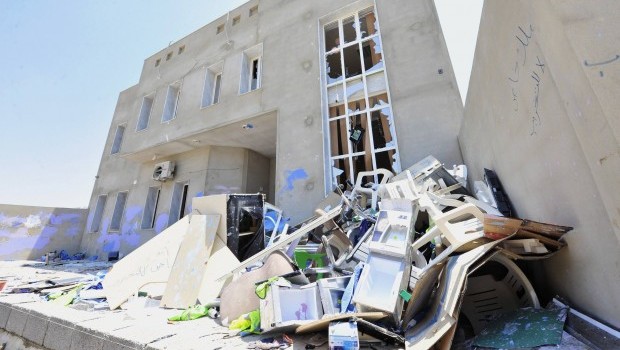
The headquarters of the Muslim Brotherhood, destroyed by protesters against the the killing of lawyer and prominent Libyan political activist Abdelsalam al-Mosmary, are seen in Benghazi July 27, 2013. Reuters/Esam Al-Fetori
Cairo, Asharq Al-Awsat—The funeral of the well-known Libyan activist and lawyer, Abd Al-Salam Al-Mismary, was held on Saturday. He was shot dead by unknown assailants while exiting a mosque in Benghazi after Friday prayers. The shooting came as part of a series of assassinations that have swept the country in recent months.
In response to the assassination, angry demonstrators attacked the headquarters of the Justice and Construction Party—the political arm of the Muslim Brotherhood—in Benghazi. National Forces Alliance offices were also attacked. Together the two blocs dominate Libya’s parliament, the General National Congress.
Many hold politicians responsible for the presence of armed insurgents—a hangover from the revolution that removed Libya’s former ruler, Muammar Gaddafi.
Members of the National Congress for Benghazi said that they had issued official requests to the prime minister, the interior minister, and the director of Libyan intelligence. They hope next week to hold the figures to account for the assassinations witnessed by the city.
These events coincided with the escape of roughly 1200 inmates from Kuwaifiyah prison, also in the country’s second largest city. A spokesman announced that security forces have managed to recapture some of the escapees.
Meanwhile, a number of foreign ambassadors left the capital, Tripoli—an indication that further instability is expected. A Libyan official told Asharq Al-Awsat that Deborah Jones, the newly appointed US ambassador to Libya, left yesterday unannounced. Similarly, the Maltese embassy locked the doors to its diplomatic mission—the last remaining source of visas for the European Schengen zone.
Political uncertainty was furthered when prime minister Ali Zeidan signaled towards the resignation of his government, and his bloc is thought to be considering withdrawal from parliament.
Zeidan disclosed in a press conference Thursday evening that the General National Congress and the government were taking all necessary measures to prevent violent offences. He also asked citizens to be patient and reasonable, urging them not to succumb to anger.
The prime minister stressed that the supply and spread of arms outside of military and police forces—under the pretext of the revolution or maintaining national security—is detrimental and threatening to everyone, including civilians.
“If arms are [present] outside of the legal framework—which is known by the nation to be the military and the police—it would be fatal. It will destroy those who believe that weapons will protect them. Arms are present among those who kept them after looting the storage facilities of the former regime during the revolution,” Zeidan said.
“The government is not keen in any way to remain in this position,” Zeidan continued. “The National Congress assures legitimacy and arrived via elections. [Those who] neglect this, in the midst of high emotions, may not be aware of the implications” that could lead the country down an ominous path.
Despite the prime minister’s statement, the National Forces Alliance, led by Dr Mahmoud Jibril, threatened to withdraw from Zeidan’s government—first formed in November of last year.
The alliance said yesterday in a statement that it was “giving the government three days to present the facts, or the ministerial bloc would withdraw completely from the government.”
For his part, the general guide (leader) of the Muslim Brotherhood in Libya, Bashir Al-Kubti, asserted that the Libyan Muslim Brotherhood does not resort to murder and assassination, and that the group deplores and condemns such actions. He also urged the judiciary to serve as an arbitrator in political disputes.
